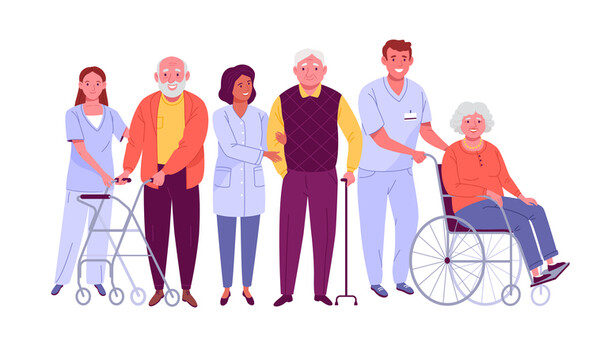Korean biopharmaceutical companies are entering the “senior business,” including medical and care services for older adults, preparing for the nation’s transition to a super-aging society.
According to Statistics Korea, it is predicted that by 2025, the nation will enter a super-aged society where 20 percent of the population is 65 and older.

In response, the government is implementing policies to support the vulnerable members of society who need care. Early this year, the Ministry of Health and Welfare selected 12 localities to pilot a project for integrated medical and care support for older adults. The ministry also plans to establish an integrated service system for medical and other care so that older adults can have a healthy life in the community by 2025.
The industry is also active. Biopharmaceutical and bio-health companies have recently been developing businesses targeting older adults. Various businesses that support their healthy aging, such as health counseling visits to vulnerable communities, nursing and care services, and medical devices that improve diseases caused by old age, are receiving attention.
For instance, Chongkundang Industry, an affiliate of Chong Kun Dang, is expanding its senior care business by acquiring Heritage Nursing Home. It is reportedly operating a specialized rehabilitation treatment center and nursing home by linking them with large hospitals in case of emergencies. In 2021, Chongkundang Industry opened a personalized nursing home, “Bell Forest.”
LifeSemantics, a digital health company, is building a non-face-to-face environment for the medically vulnerable to manage their health. In May, LifeSemantics was selected as the main contractor for the “Non-face-to-face healthcare promotion and support service for the elderly health project,” organized by the Seoul Metropolitan Government, providing ICT-based non-face-to-face consultation services.
The non-face-to-face health consultation, which officially began on Monday, will be provided through large health centers in Seoul and visits to patients’ homes until September.
Through this project, the company also plans to increase medical accessibility for elderly patients who have difficulty visiting hospitals by establishing a non-face-to-face counseling service infrastructure. In addition, it will provide content, including medication guidance, exercise, and nutrition management, through the non-face-to-face healthcare platform and run real-time health education programs using video equipment.
Care Nation, an integrated care platform, launched an accompaniment service early this year to help patients with mobility problems move safely and provides a companion-matching service that performs, in and outside of hospitals, tasks, such as assisting with medical appointments, receiving medication, and other tasks required for medical examinations and checkups. In April, it launched a home care matching service that aids household cleaning and daily care.
GOS, which developed GOSCARE SERA, a gait training device for stroke patients, recently expanded and relocated its Muscle Research Center to improve the quality of life for seniors. The center studies technologies that complement and solve problems arising from gait, muscle strength, disease, and longevity for older adults.

